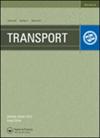METHOD OF TESTING THE READINESS OF MEANS OF TRANSPORT WITH THE USE OF SEMI-MARKOV PROCESSES
IF 1.3
4区 工程技术
Q3 TRANSPORTATION SCIENCE & TECHNOLOGY
引用次数: 2
Abstract
In the analysis of the readiness of means of transport, the Markov and semi-Markov processes are particularly applicable, allowing for the description of the usage process over long periods of time, determination of indicators of the exploitability and readiness of the used set of objects, as well as simulation of long-term forecasts of the usage process results. The studies presented in the literature usually concern the theoretical side of the matter, mainly the construction of formal models of the process of changing the operating states of a vehicle. Less attention is paid to the empirical side, especially with regard to the actual conditions of use. Examples of experimental observations presented in the literature most often concern individual cases. This paper lists selected irregularities and presents an example of a study of a real transport system based on semi-Markov processes.用半马尔可夫过程检验运输工具的准备状态的方法
在分析运输工具的准备情况时,马尔可夫和半马尔可夫过程特别适用,允许描述长时间的使用过程,确定使用的一组对象的可利用性和准备情况的指标,以及模拟使用过程结果的长期预测。文献中提出的研究通常涉及问题的理论方面,主要是构建车辆运行状态变化过程的正式模型。较少注意经验方面,特别是在实际使用条件方面。文献中提出的实验观察的例子通常涉及个案。本文列举了一些不规则性,并给出了一个基于半马尔可夫过程的实际输运系统的研究实例。
本文章由计算机程序翻译,如有差异,请以英文原文为准。
求助全文
约1分钟内获得全文
求助全文
来源期刊

Transport
Engineering-Mechanical Engineering
CiteScore
3.40
自引率
5.90%
发文量
19
审稿时长
4 months
期刊介绍:
At present, transport is one of the key branches playing a crucial role in the development of economy. Reliable and properly organized transport services are required for a professional performance of industry, construction and agriculture. The public mood and efficiency of work also largely depend on the valuable functions of a carefully chosen transport system. A steady increase in transportation is accompanied by growing demands for a higher quality of transport services and optimum efficiency of transport performance. Currently, joint efforts taken by the transport experts and governing institutions of the country are required to develop and enhance the performance of the national transport system conducting theoretical and empirical research.
TRANSPORT is an international peer-reviewed journal covering main aspects of transport and providing a source of information for the engineer and the applied scientist.
The journal TRANSPORT publishes articles in the fields of:
transport policy;
fundamentals of the transport system;
technology for carrying passengers and freight using road, railway, inland waterways, sea and air transport;
technology for multimodal transportation and logistics;
loading technology;
roads, railways;
airports, ports, transport terminals;
traffic safety and environment protection;
design, manufacture and exploitation of motor vehicles;
pipeline transport;
transport energetics;
fuels, lubricants and maintenance materials;
teamwork of customs and transport;
transport information technologies;
transport economics and management;
transport standards;
transport educology and history, etc.
 求助内容:
求助内容: 应助结果提醒方式:
应助结果提醒方式:


